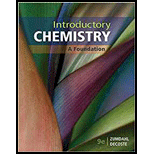
Concept explainers
Lithium nitride, an ionic compound containing the
Trending nowThis is a popular solution!
Learn your wayIncludes step-by-step video

Chapter 9 Solutions
Introductory Chemistry: A Foundation
- Boron forms an extensive series of compounds with hydrogen, all with the general formula BxHy. To analyze one of these compounds, you burn it in air and isolate the boron in the form of B2O3 and the hydrogen in the form of water. You find that 0.1482 g BxHy gives 0.4221 g B2O3 when burned in excess O2. Determine the empirical I formula of BxHy.arrow_forward4.84 Aluminum chloride (AlCl3) is used as a catalyst in the production of polyisobutylene, which is used in automobile tires. Scrap aluminum metal reacts with chlorine gas (Cl2) to produce AlCl3. Suppose that 2.70 g of Al and 7.10 g of Cl2 are mixed. What is the maximum mass of AlCl3 that could be formed?arrow_forwardThe molecular formula of acetylsalicylic acid (aspirin), one of the most commonly used pain relievers, is C9H8O4. a. Calculate the molar mass of aspirin. b. A typical aspirin tablet contains 500. mg C9H8O4. What amount (moles) of C9H8O4 molecules and what number of molecules of acetylsalicylic acid are in a 500.-mg tablet?arrow_forward
- The sugar sucrose, which is present in many fruits and vegetables, reacts in the presence of certain yeast enzymes to produce ethanol and carbon dioxide gas. Balance the following equation for this reaction of sucrose. C12H22O11(aq) + H2O(l) C2H5OH(aq) + CO2(g)arrow_forwardWhat mass of HCI, in grams, is required to react with 0.750 g of Al(OH)3? What mass of water, in grams, is produced? Al(OH)3(s) + 3 HCI(aq) AlCl3(aq) + 3 H2O(l)arrow_forwardCisplatin, Pt(NH3)2Cl2, a drug used in the treatment of cancer, can be made by the reaction of K2PtCl4 with ammonia, NH3. Besides cisplatin, the other product is KCl. (a) Write a balanced equation for this reaction. (b) To obtain 2.50 g cisplatin, calculate what masses (in grams) of K2PtCl4 and ammonia you need.arrow_forward
- Ethylene glycol is used as an automobile antifreeze and in the manufacture of polyester fibers. The name glycol stems from the sweet taste of this poisonous compound. Combustion of 6.38 mg of ethylene glycol gives 9.06 mg CO2 and 5.58 mg H2O. The compound contains only C, H, and O. What are the mass percentages of the elements in ethylene glycol?arrow_forward4.69 The pictures below show a molecular-scale view of a chemical reaction between H2 and CO to produce methanol, CH3OH. The box on the left represents the reactants at the instant of mixing, and the box on the right shows what is left once the reaction has gone to completion. Was there a limiting reactant in this reaction? If so, what was it? Write a balanced chemical equation for this reaction. As usual, your equation should use the smallest possible whole number coefficients for all substances.arrow_forwardA solution of scandium chloride was treated with silver nitrate. The chlorine in the scandium compound was converted to silver chloride, AgCl. A 58.9-mg sample of scandium chloride gave 167.4 mg of silver chloride. What are the mass percentages of Sc and Cl in scandium chloride? What is its empirical formula?arrow_forward
- You take 1.00 g of an aspirin tablet (a compound consisting solely of carbon, hydrogen, and oxygen), burn it in air, and collect 2.20 g CO2 and 0.400 g H2O. You know that the molar mass of aspirin is between 170 and 190 g/mol. Reacting 1 mole of salicylic acid with I mole of acetic anhydride (C4H6O3) gives you 1 mole of aspirin and 1 mole of acetic acid (C2H4O2). Use this information to determine the molecular formula of salicylic acid.arrow_forwardA gas contains a mixture of NH3(g) and N2H4(g), both of which react with O2(g) to form NO2(g) and H2O(g). The gaseous mixture (with an initial mass of 61.00 g) is reacted with 10.00 moles O2, and after the reaction is complete, 4.062 moles of O2 remains. Calculate the mass percent of N2H4(g) in the original gaseous mixture.arrow_forward4.108 Elemental analysis is sometimes carried out by combustion of the sample. For a hydrocarbon, the only products formed are CO2 and H2O. If a 1.36-g sample of an unknown hydrocarbon is burned and 2.21 g of H2O is produced along with 4.07 g of CO2, what is the empirical formula of the hydrocarbon?arrow_forward
 Chemistry: Principles and PracticeChemistryISBN:9780534420123Author:Daniel L. Reger, Scott R. Goode, David W. Ball, Edward MercerPublisher:Cengage Learning
Chemistry: Principles and PracticeChemistryISBN:9780534420123Author:Daniel L. Reger, Scott R. Goode, David W. Ball, Edward MercerPublisher:Cengage Learning Chemistry for Engineering StudentsChemistryISBN:9781337398909Author:Lawrence S. Brown, Tom HolmePublisher:Cengage Learning
Chemistry for Engineering StudentsChemistryISBN:9781337398909Author:Lawrence S. Brown, Tom HolmePublisher:Cengage Learning Chemistry & Chemical ReactivityChemistryISBN:9781133949640Author:John C. Kotz, Paul M. Treichel, John Townsend, David TreichelPublisher:Cengage Learning
Chemistry & Chemical ReactivityChemistryISBN:9781133949640Author:John C. Kotz, Paul M. Treichel, John Townsend, David TreichelPublisher:Cengage Learning ChemistryChemistryISBN:9781305957404Author:Steven S. Zumdahl, Susan A. Zumdahl, Donald J. DeCostePublisher:Cengage Learning
ChemistryChemistryISBN:9781305957404Author:Steven S. Zumdahl, Susan A. Zumdahl, Donald J. DeCostePublisher:Cengage Learning Chemistry: An Atoms First ApproachChemistryISBN:9781305079243Author:Steven S. Zumdahl, Susan A. ZumdahlPublisher:Cengage Learning
Chemistry: An Atoms First ApproachChemistryISBN:9781305079243Author:Steven S. Zumdahl, Susan A. ZumdahlPublisher:Cengage Learning





